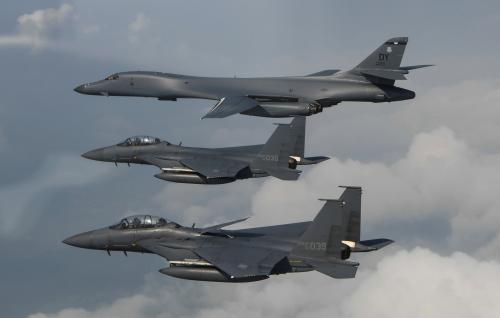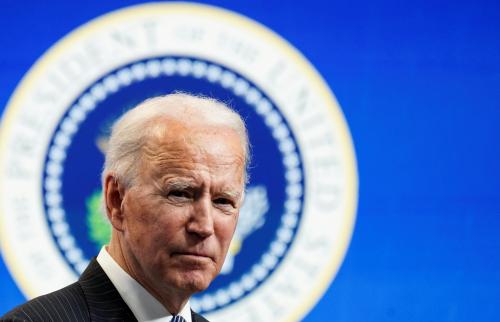Content from the Brookings Doha Center is now archived. In September 2021, after 14 years of impactful partnership, Brookings and the Brookings Doha Center announced that they were ending their affiliation. The Brookings Doha Center is now the Middle East Council on Global Affairs, a separate public policy institution based in Qatar.
A version of this opinion was also published by
Gulf News through assistance of the Brookings Doha Center.
For all the focus on Iraq in the media and the presidential campaign, that conflict may not be the most challenging defense issue for our next commander in chief. Terrorist networks, unstable and failing states and various dangerous regimes are going to pose threats long after any end to the Iraq conflict. Even more difficult, though, will be the task of leading, and maintaining the quality of, the all-volunteer U.S. military.
A nation of 300 million people should not be struggling to find enough citizens to serve; yet we are. When various presidential candidates try to show how ”tough” they are on defense, they tend only to talk about how the solution is merely to add more troops. This shows both a misunderstanding of the nature of the threats we face as well as a failure to acknowledge the reality of today’s military personnel needs.
Those who would be the next commander in chief must face up to the enormous struggle already underway to meet staffing targets. Our military has recently been forced to accept far greater numbers of less-qualified enlistees than it would have in the past, many with low test scores, a criminal background and/or no high school diploma. Hundreds of military recruiters under pressure to meet the numbers have already been faulted for cutting corners, fewer recruits are washing out in training, and special operations forces — our most elite units — are markedly under strength.
In turn, the force is having a tough time retaining its leaders of tomorrow. The Army has a 3,000-person shortfall of captains and majors. As a result, the old military adage of ”up or out,” a policy which promoted the best possible officer corps, has gradually been undermined. Many are rightly concerned about the long-term effects.
And there are deeper trend lines that will shape our military’s future. A study of attitudes among Millenials — the new generation of youths born between 1980 and 2000 — found that only 14 percent think the military would prepare them well for another career.
Indeed, the real impact of Iraq on recruiting may be on long-term generational attitudes. The overall percentage of youth who describe themselves as less willing to even consider military service doubled from 26 percent in 2003 to 52 percent in 2007; the figures jumped to 67 percent and 66 percent for African-American and Hispanic youths.
While today’s focus is on the five-year war in Iraq, if we care about our nation’s long-term security, we must also ask our would-be commanders in chief whether they will meet this leadership issue head-on? Or, do they plan to continue to dump what may be our deepest national defense challenge on the 28-year-old recruiting sergeants in the field?
This predicament will worsen as the forces expand by roughly 100,000, or more, under current plans. It is for this reason our military desperately needs a commander in chief who can lead and motivate today’s generation toward public service in the same way presidents Kennedy and Reagan did for past generations — reaching out to youth as well as to the parents, religious leaders, coaches and teachers who influence them.
Invasion is not all
And, as demonstrated by the shameful events at Walter Reed hospital and the recent reports of homeless or out-of-work veterans, our newest generation of wounded warriors and veterans have earned the right to demand a commander in chief who is poised to serve them as well as they served us.
Being a good commander in chief is not just about crucial invasion decisions; it is also about taking on the full responsibilities of leading those who serve. As Campaign ’08 reaches its final run, it is time to get past the empty posturing and focus on the hard questions of who has the qualities needed to ensure our Millennial military will be ready and able to serve our nation’s needs in the years ahead.


Commentary
Op-edTrain and Protect Those Who Serve Us in the Military
April 8, 2008